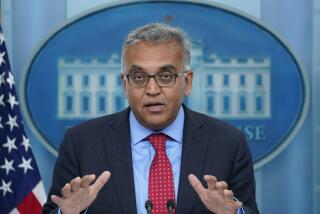Growth Spurt Could Shift Focus of Clinton’s Strategy
- Share via
WASHINGTON — Amid growing signs that the economy is on the mend, President-elect Bill Clinton said Wednesday that he may pull back from plans for a short-term stimulus package, while his top economic adviser disclosed that transition officials are considering deeper cuts in federal spending than Clinton advocated during the presidential campaign.
Thus a new and rosier economic outlook may give Clinton enough breathing room to concentrate more directly on crafting a long-term economic agenda focused on public investment and deficit reduction, without worrying about a quick economic fix that would further strain the budget.
For weeks, the Clinton camp has been torn over how to balance basic but conflicting objectives: short-term economic growth versus long-term deficit reduction. Until Wednesday’s report, the need to give the economy a jolt early next year--and to contrast Clinton’s activist economic policies with those of President Bush--seemed to have taken precedence with Clinton and his advisers.
But in response to a government report that the economy grew at an unexpectedly strong 3.9% rate in the third quarter, Clinton said in Little Rock, Ark., that the figure “could have some impact on short-term judgments” about the need for stimulative tax cuts or spending hikes early next year. “It could be that we are finally seeing the impact of lower interest rates,” Clinton added.
Clinton stressed, however, that he expects no shift in his long-term economic strategy, which is aimed at fighting the more fundamental problems of falling productivity and wages by increasing government investment in public works, education and job training.
Yet Clinton still hedged his comments, and made it clear that he was not willing to change course just because of Wednesday’s report. “It’s obviously good news but it requires a lot of analysis,” Clinton said. “There are a lot of conflicting things here.”
In a separate interview, the President-elect’s top economic adviser, Robert B. Reich, also reacted cautiously to Wednesday’s economic data. Reich said that the report would be “figured into our thinking” about whether a stimulus plan is needed. But he added that the report is “a bit inconsistent with what we are hearing” elsewhere about the economy. “It is premature to say this has swayed our thinking,” on the need for a stimulus package.
Reich, a lecturer at the Kennedy School of Government at Harvard University, also suggested that the Clinton team is becoming increasingly concerned about the budget outlook, and the need to make additional cuts in federal spending. He said that the transition team is working to develop options for spending cuts that would go beyond Clinton’s campaign agenda to reduce outlays by $144 billion over four years.
Reich said that the additional savings could be used either to expand “investment” spending programs or to reduce the budget deficit, which Clinton has promised to reduce by half over the next four years. But Reich added that the proposals would not diverge wildly from the campaign agenda.
“We want President-elect Clinton to have a full array of options,” Reich said. “But we’re not going to present politically impossible things.
“It would be inappropriate to stray too far from ‘Putting People First’ (as Clinton characterized his economic program during the campaign) but we do want to offer options, some of which are not in the four corners of that document.” Reich refused to identify which programs might be new candidates for the budget ax.
The comments by Clinton and Reich appear to reflect a growing recognition of the harsh budget realities that the new Administration will confront and the need to finance public works investments and other programs in ways that avoid big increases in the deficit.
In fact, the cold, hard budget numbers seem to have left Reich increasingly suspicious of the validity of the deficit forecasts he is inheriting from the Bush Administration. On Monday, Reich met with Richard G. Darman, director of the White House Office of Management and Budget, in a lengthy, confidential session, receiving a detailed briefing on the budget outlook and the byzantine federal budget process.
Reich indicated that he remains concerned the Administration has underestimated its deficit forecasts.
“I’ve heard enough rumor, gossip and innuendo about actual spending patterns in some of the big spending programs in 1993, 1994 . . . that I want to check and recheck the numbers coming out of OMB to ensure that the base-line numbers are accurate,” Reich said Wednesday.
Reich refused to elaborate on specific programs that concern him and he added that Darman told him that he should not be concerned about the validity of the forecasts produced by OMB. In an interview, Darman would not respond to Reich’s comments.
But congressional budget experts believe that Reich, who has never before attempted to craft a federal budget, has been confused by recent changes in deficit forecasts that have been caused by Congress’ failure earlier this year to provide additional funding for the S&L; bailout. That delay has forced a shift in those S&L; costs from 1992 to 1993, inflating next year’s deficit figures.
Reich acknowledged that S&L; funding remains a big question mark in the budget. “There are many variables, but it is critical to establish a realistic base line,” in the budget from which Clinton can work, he added.
Reich said that Darman told him the Bush Administration does not plan to issue a full fiscal-year budget but instead will provide a short budget summary. He added that it will be difficult for the transition team to produce a full budget by its due date of Feb. 1, and indicated that Clinton may have to ask Congress for an extension to submit a full budget later.
Reich also said that the transition team is looking closely at the rules of the 1990 budget agreement, which will govern the budget process that Clinton inherits. He said that the transition team will present Clinton with options on how he could change or suspend the budget agreement to enact new economic proposals.
Other sources knowledgeable about the transition team’s approach to the budget suggest that the Clinton camp still seems light on in-depth expertise in budget matters. That may change quickly, however, since Clinton now seems to be close to making his first key appointments for his Administration.
Sources said that Alice Rivlin, a former director of the Congressional Budget Office and now a budget analyst at the Brookings Institution in Washington, seems to have the inside track on being named Clinton’s budget director. Rivlin is said to have met with Clinton privately in recent days.
Risen reported from Washington and Richter from Little Rock
* CABINET POSSIBILITIES: President-elect Bill Clinton said he is near decisions on “a few” Cabinet officials. A37
* ‘CLUSTER’ CHIEFS: The heads of “cluster groups” that will audit federal agencies for Clinton were named. A38
More to Read
Inside the business of entertainment
The Wide Shot brings you news, analysis and insights on everything from streaming wars to production — and what it all means for the future.
You may occasionally receive promotional content from the Los Angeles Times.











